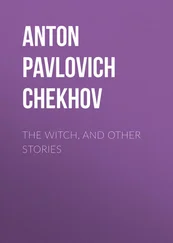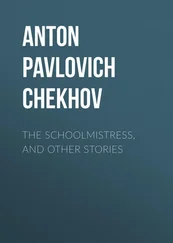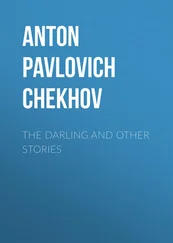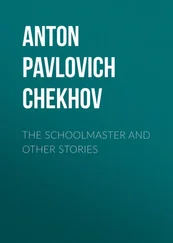Anton Chekhov - The Bishop and Other Stories
Здесь есть возможность читать онлайн «Anton Chekhov - The Bishop and Other Stories» весь текст электронной книги совершенно бесплатно (целиком полную версию без сокращений). В некоторых случаях можно слушать аудио, скачать через торрент в формате fb2 и присутствует краткое содержание. Жанр: Классическая проза, на английском языке. Описание произведения, (предисловие) а так же отзывы посетителей доступны на портале библиотеки ЛибКат.
- Название:The Bishop and Other Stories
- Автор:
- Жанр:
- Год:неизвестен
- ISBN:нет данных
- Рейтинг книги:3 / 5. Голосов: 1
-
Избранное:Добавить в избранное
- Отзывы:
-
Ваша оценка:
- 60
- 1
- 2
- 3
- 4
- 5
The Bishop and Other Stories: краткое содержание, описание и аннотация
Предлагаем к чтению аннотацию, описание, краткое содержание или предисловие (зависит от того, что написал сам автор книги «The Bishop and Other Stories»). Если вы не нашли необходимую информацию о книге — напишите в комментариях, мы постараемся отыскать её.
The Bishop and Other Stories — читать онлайн бесплатно полную книгу (весь текст) целиком
Ниже представлен текст книги, разбитый по страницам. Система сохранения места последней прочитанной страницы, позволяет с удобством читать онлайн бесплатно книгу «The Bishop and Other Stories», без необходимости каждый раз заново искать на чём Вы остановились. Поставьте закладку, и сможете в любой момент перейти на страницу, на которой закончили чтение.
Интервал:
Закладка:
"What a pretty boy!" said the lady. "Whose boy is it? Kazimir Mihalovitch, look what a charming fellow! Good heavens, he is asleep!"
And the lady kissed Yegorushka warmly on both cheeks, and he smiled and, thinking he was asleep, shut his eyes. The swing-door squeaked, and there was the sound of hurried footsteps, coming in and going out.
"Yegorushka, Yegorushka!" he heard two bass voices whisper. "Get up; it is time to start."
Somebody, it seemed to be Deniska, set him on his feet and led him by the arm. On the way he half-opened his eyes and once more saw the beautiful lady in the black dress who had kissed him. She was standing in the middle of the room and watched him go out, smiling at him and nodding her head in a friendly way. As he got near the door he saw a handsome, stoutly built, dark man in a bowler hat and in leather gaiters. This must have been the lady's escort.
"Woa!" he heard from the yard.
At the front door Yegorushka saw a splendid new carriage and a pair of black horses. On the box sat a groom in livery, with a long whip in his hands. No one but Solomon came to see the travellers off. His face was tense with a desire to laugh; he looked as though he were waiting impatiently for the visitors to be gone, so that he might laugh at them without restraint.
"The Countess Dranitsky," whispered Father Christopher, clambering into the chaise.
"Yes, Countess Dranitsky," repeated Kuzmitchov, also in a whisper.
The impression made by the arrival of the countess was probably very great, for even Deniska spoke in a whisper, and only ventured to lash his bays and shout when the chaise had driven a quarter of a mile away and nothing could be seen of the inn but a dim light.
IV
Who was this elusive, mysterious Varlamov of whom people talked so much, whom Solomon despised, and whom even the beautiful countess needed? Sitting on the box beside Deniska, Yegorushka, half asleep, thought about this person. He had never seen him. But he had often heard of him and pictured him in his imagination. He knew that Varlamov possessed several tens of thousands of acres of land, about a hundred thousand sheep, and a great deal of money. Of his manner of life and occupation Yegorushka knew nothing, except that he was always "going his rounds in these parts," and he was always being looked for.
At home Yegorushka had heard a great deal of the Countess Dranitsky, too. She, too, had some tens of thousands of acres, a great many sheep, a stud farm and a great deal of money, but she did not "go rounds," but lived at home in a splendid house and grounds, about which Ivan Ivanitch, who had been more than once at the countess's on business, and other acquaintances told many marvellous tales; thus, for instance, they said that in the countess's drawing-room, where the portraits of all the kings of Poland hung on the walls, there was a big table-clock in the form of a rock, on the rock a gold horse with diamond eyes, rearing, and on the horse the figure of a rider also of gold, who brandished his sword to right and to left whenever the clock struck. They said, too, that twice a year the countess used to give a ball, to which the gentry and officials of the whole province were invited, and to which even Varlamov used to come; all the visitors drank tea from silver samovars, ate all sorts of extraordinary things (they had strawberries and raspberries, for instance, in winter at Christmas), and danced to a band which played day and night. . . .
"And how beautiful she is," thought Yegorushka, remembering her face and smile.
Kuzmitchov, too, was probably thinking about the countess. For when the chaise had driven a mile and a half he said:
"But doesn't that Kazimir Mihalovitch plunder her right and left! The year before last when, do you remember, I bought some wool from her, he made over three thousand from my purchase alone."
"That is just what you would expect from a Pole," said Father
Christopher.
"And little does it trouble her. Young and foolish, as they say, her head is full of nonsense."
Yegorushka, for some reason, longed to think of nothing but Varlamov and the countess, particularly the latter. His drowsy brain utterly refused ordinary thoughts, was in a cloud and retained only fantastic fairy-tale images, which have the advantage of springing into the brain of themselves without any effort on the part of the thinker, and completely vanishing of themselves at a mere shake of the head; and, indeed, nothing that was around him disposed to ordinary thoughts. On the right there were the dark hills which seemed to be screening something unseen and terrible; on the left the whole sky about the horizon was covered with a crimson glow, and it was hard to tell whether there was a fire somewhere, or whether it was the moon about to rise. As by day the distance could be seen, but its tender lilac tint had gone, quenched by the evening darkness, in which the whole steppe was hidden like Moisey Moisevitch's children under the quilt.
Corncrakes and quails do not call in the July nights, the nightingale does not sing in the woodland marsh, and there is no scent of flowers, but still the steppe is lovely and full of life. As soon as the sun goes down and the darkness enfolds the earth, the day's weariness is forgotten, everything is forgiven, and the steppe breathes a light sigh from its broad bosom. As though because the grass cannot see in the dark that it has grown old, a gay youthful twitter rises up from it, such as is not heard by day; chirruping, twittering, whistling, scratching, the basses, tenors and sopranos of the steppe all mingle in an incessant, monotonous roar of sound in which it is sweet to brood on memories and sorrows. The monotonous twitter soothes to sleep like a lullaby; you drive and feel you are falling asleep, but suddenly there comes the abrupt agitated cry of a wakeful bird, or a vague sound like a voice crying out in wonder "A-ah, a-ah!" and slumber closes one's eyelids again. Or you drive by a little creek where there are bushes and hear the bird, called by the steppe dwellers "the sleeper," call "Asleep, asleep, asleep!" while another laughs or breaks into trills of hysterical weeping-that is the owl. For whom do they call and who hears them on that plain, God only knows, but there is deep sadness and lamentation in their cry. . . . There is a scent of hay and dry grass and belated flowers, but the scent is heavy, sweetly mawkish and soft.
Everything can be seen through the mist, but it is hard to make out the colours and the outlines of objects. Everything looks different from what it is. You drive on and suddenly see standing before you right in the roadway a dark figure like a monk; it stands motionless, waiting, holding something in its hands. . . . Can it be a robber? The figure comes closer, grows bigger; now it is on a level with the chaise, and you see it is not a man, but a solitary bush or a great stone. Such motionless expectant figures stand on the low hills, hide behind the old barrows, peep out from the high grass, and they all look like human beings and arouse suspicion.
And when the moon rises the night becomes pale and dim. The mist seems to have passed away. The air is transparent, fresh and warm; one can see well in all directions and even distinguish the separate stalks of grass by the wayside. Stones and bits of pots can be seen at a long distance. The suspicious figures like monks look blacker against the light background of the night, and seem more sinister. More and more often in the midst of the monotonous chirruping there comes the sound of the "A-ah, a-ah!" of astonishment troubling the motionless air, and the cry of a sleepless or delirious bird. Broad shadows move across the plain like clouds across the sky, and in the inconceivable distance, if you look long and intently at it, misty monstrous shapes rise up and huddle one against another. . . . It is rather uncanny. One glances at the pale green, star-spangled sky on which there is no cloudlet, no spot, and understands why the warm air is motionless, why nature is on her guard, afraid to stir: she is afraid and reluctant to lose one instant of life. Of the unfathomable depth and infinity of the sky one can only form a conception at sea and on the steppe by night when the moon is shining. It is terribly lonely and caressing; it looks down languid and alluring, and its caressing sweetness makes one giddy.
Читать дальшеИнтервал:
Закладка:
Похожие книги на «The Bishop and Other Stories»
Представляем Вашему вниманию похожие книги на «The Bishop and Other Stories» списком для выбора. Мы отобрали схожую по названию и смыслу литературу в надежде предоставить читателям больше вариантов отыскать новые, интересные, ещё непрочитанные произведения.
Обсуждение, отзывы о книге «The Bishop and Other Stories» и просто собственные мнения читателей. Оставьте ваши комментарии, напишите, что Вы думаете о произведении, его смысле или главных героях. Укажите что конкретно понравилось, а что нет, и почему Вы так считаете.











